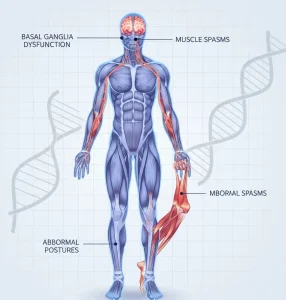Overview
Diagnosis
Diagnosing dystonia begins with a detailed medical history and a physical examination by your healthcare provider. The goal is to identify underlying conditions or causes that may be contributing to your symptoms.
Common diagnostic tests include:
-
Blood or urine tests: These help detect signs of toxins or metabolic conditions that could be causing or worsening dystonia.
-
MRI or CT scan: Imaging tests are used to look for structural changes in the brain, such as tumors, lesions, or signs of a stroke.
-
Electromyography (EMG): This test measures the electrical activity of muscles to assess abnormal muscle contractions or nerve signals.
-
Genetic testing: Some types of dystonia are hereditary. Identifying specific gene mutations can confirm a diagnosis and guide treatment choices.
Treatment
Treatment for dystonia focuses on reducing involuntary muscle contractions, improving function, and enhancing quality of life. A combination of medication, therapy, and sometimes surgery is typically used.
Medicines
Several medicines can help manage muscle spasms or control abnormal signals in the brain:
-
Botulinum toxin injections (Botox, Dysport, others): These are injected into affected muscles to temporarily weaken them and relieve spasms. Injections are usually repeated every 3–4 months. Side effects are mild and short-term, such as muscle weakness, dry mouth, or voice changes.
-
Carbidopa-levodopa (Duopa, Rytary, others): This medication increases dopamine levels and may be used both for treatment and to help confirm certain types of dystonia.
-
Trihexyphenidyl and benztropine: These anticholinergic drugs work on neurotransmitters other than dopamine. Side effects can include blurred vision, dry mouth, constipation, drowsiness, and memory issues.
-
Tetrabenazine (Xenazine) and deutetrabenazine (Austedo): These medicines block dopamine and may help control muscle contractions. Side effects can include drowsiness, depression, or nervousness.
-
Diazepam (Valium), clonazepam (Klonopin), and baclofen (Lioresal): These drugs reduce excessive nerve signaling and may be prescribed for certain dystonia types. They can cause sedation or dizziness.
Therapy
Therapy supports physical function and helps manage daily challenges associated with dystonia. Options may include:
-
Physical and occupational therapy: To improve movement, posture, and coordination while reducing muscle tightness.
-
Speech therapy: For individuals whose dystonia affects speech or voice muscles.
-
Stretching and massage: To relieve pain and reduce muscle tension.
Surgery
When dystonia symptoms are severe or don’t respond to medication, surgical treatments may be considered. Common procedures include:
-
Deep brain stimulation (DBS): Electrodes are implanted in specific areas of the brain and connected to a generator in the chest. The device sends controlled electrical impulses to regulate abnormal muscle activity. The settings can be adjusted based on individual needs.
-
Selective denervation surgery: In this procedure, the nerves responsible for muscle spasms are surgically cut. It may be used when other treatments, particularly for cervical dystonia, are not effective.
Ongoing follow-up care, including medication management and therapy, is essential to maintain results and improve quality of life.
Advertisement

